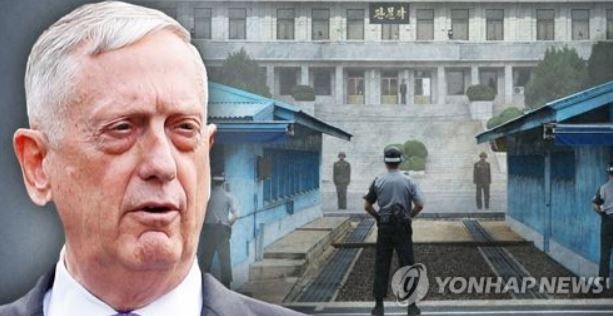PANMUNJOM, Korea -- As North Korean soldiers looked on over the heavily fortified border, US Secretary of Defense James Mattis said Friday his administration does not want war but hopes for the complete denuclearization of Korea.
He urged the Kim Jong-un regime to halt provocations that threaten others "with catastrophe."
"As Secretary of State Tillerson has made clear, our goal is not war but rather the complete, verifiable and irreversible denuclearization of the Korean Peninsula," the Pentagon chief said in a brief statement at the truce village of Panmunjom inside the Demilitarized Zone, the 2.5-mile wide strip of land separating the two Koreas.

(Yonhap)
Standing several meters away from the North, he stressed his DMZ visit highlights the "stark difference" between the two Koreas.
The North is ridden with an "oppressive regime" that shackles its people, while the South boasts a vibrant, thriving democracy and free society, he pointed out.
He recalled a meeting with South Korean Defense Minister Song Young-moo in Clark, the Philippines, on the sidelines of an ASEAN security forum earlier this week.
"Two days ago at the ASEAN meeting we made clear our mutual commitment to a diplomatic solution to address North Korea's reckless, outlaw behavior," Mattis said.
Reading out his own statement next to Mattis, South Korean Defense Minister Song Young-moo emphasized that the North's nuke and ballistic missiles are "weapons that can't be used."
"If it does, it will face retaliation by the strong combined force of South Korea and the US," he said.
The minister said he and the secretary are here together to confirm the ironclad alliance "without a single inch of error."
He called on Pyongyang to return to inter-Korean dialogue as early as possible.
Song said Panmunjom was once a venue for talks between the two Koreas and armistice negotiations that effectively ended the\ 1950-53 Korean War.
"But now, all dialogue is in a state of being severed," he added.
Their DMZ visit came on the eve of the allies' annual defense ministerial Security Consultative Meeting in Seoul.
It comes amid more than a month of let-up in the North's provocative acts following a series of missile launches and a nuclear test.
There's speculation that Pyongyang and Washington are in secret contact to explore dialogue.
Mattis arrived in South Korea earlier in the day. Shortly after landing at Camp Bonifas by Black Hawk chopper, he and Song headed to the OP Ouellette, a hilltop border post, and looked around a bunker underneath the facilities only 25 meters away from the North's territory.
They were briefed on Panmunjom by US Army Col. Steve Lee, secretary of the United Nations Command Military Armistice Commission. They then toured the UNCMAC's blue-colored conference building which stands on the Military Demarcation Line.
The North's guards closely monitored the ministers' activities, with a group of tourists looking down from the Panmungak building in the North.
In their Clark talks, the South's minister proposed Mattis, a former Marine Corps general, wear a combat uniform for the DMZ trip to send a highly symbolic message to the North. Mattis responded positively to the offer at that time, according to Song.
But Mattis was dressed in a suit as usual after internal consultations apparently in order to avoid possible controversy over a dress code reflecting the US defense secretary's public availability.
Asked whether President Donald Trump can travel to the DMZ when he visits South Korea early next month, Mattis was guarded.
Following the DMZ tour, he paid a courtesy call on President Moon Jae-in at Cheong Wa Dae and met with Foreign Minister Kang Kyung-wha. (Yonhap)






